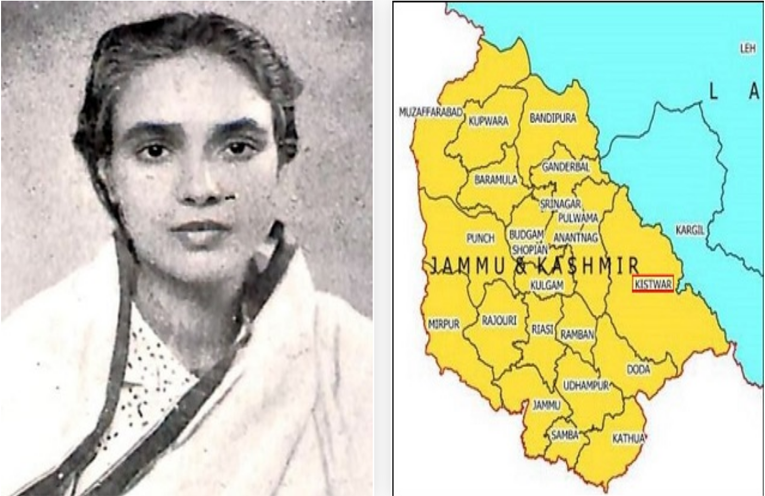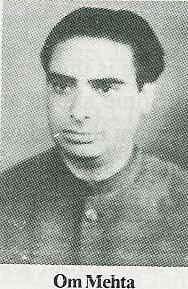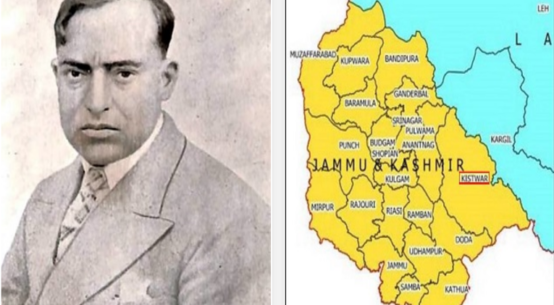
Krishna Mehta – First Lady MP from J&K
Krishna Mehta was born on 4 June 1913, in the illustrious Mehta family of Kishtwar. Her great grandfather, Colonel Mehta Basti Ram, was in Maharaja Ranjit Singh’s army helped in the annexation of Ladakh, and later, served as its Governor. Krishna Mehta was married to Duni Chand Mehta, a civil servant of Jammu and Kashmir who was posted as Wazir-e Wazarat (District Commissioner) of Muzaffarabad (a north western district of Jammu and Kashmir) during the time of Pakistan tribal invasion in 1947.
On the intervening night of 21-22 October 1947, hordes of Pakistani tribesmen from the North Western Frontier Province (NWFP), equipped with modern weapons, under the command of Major Khurshid Anwar, the officer-in-charge of the attack, crossed the border and entered Muzaffarabad and let the loose reign of terror on the civilians and government officials. Houses were looted and plundered and were set on fire. While Krishna Mehta’s husband, Mr. Duni Chand Mehta, the then Wazir-i-Wazarat of the area, was away from his residential quarters repelling the invasion, the marauders reached their home. Krishna Mehta along with her six children had to escape. They wandered from one place to another seeking refuge as they had lost everything – wealth, power, and possession. Eventually, she fell into the hands of the raiders and was kept in jails and in various refugee camps at Muzaffarabad, Domel, Rawalpindi, and Thathyal. These camps were terrible places full of horror where the refugees were treated with callousness as slaughter animals. It was in these camps that Krishna Mehta came to realize the gravity of the situation. She was deeply pained to see the plight of Hindu and Sikh women who were abducted and sold by the raiders. The vulgarity and coarseness were so casual that there was no violent rage or regret. Hunger and starvation were common and people often suffered from cholera and diarrhea, whenever they received rotten, spoiled, and awful rations.
Krishna Mehta herself suffered a lot of torture and trauma. Even after hearing the news of her husband’s revered martyrdom, she pulled herself together as she did not want to die an empty death that had no meaning. She was also persuaded to get settled on the other side of the border. Many times she was provided an easy way to escape by the Pakistani Government officials who knew her husband personally and were considerate but she never accepted these proposals as she didn’t want to prove herself unworthy of her husband.
Undaunted, unbroken in spirit, Krishna rose to every occasion. While staying in the camps, she took upon herself the task of rehabilitating the suffering women and children in the camps. The women in these camps were forcibly converted to Islam and used to live under the shadow of a strange terror of being ostracized anytime. Many of these women committed suicide by drowning themselves. Krishna Mehta felt pierced to see their deplorable condition and the level of destitution they were living in. She took it as her moral duty to save them and promised herself to do whatever she could to bring these broken women back to their normal life. By organizing rhythmic chanting of morning and evening prayers in the camps, she tried to give vent to their stifling grief and release their mind of the oppressed and burdened memories. However, she had to bear the wrath of the local Muslims. Her strong conviction to bring the Hindu and Sikh women out of the haunting terror of the raiders and infusing in them a strength of self-assurance often raged them. Many times she was threatened with dire consequences. Even amidst such appalling suffering and dangers, Krishna Mehta held her head high and did not give up on her fate. It was because of her tireless efforts that the condition of the women in the camps improved. Being from a highly revered family of the time and the wife of Wazir-e-Wazarat of Muzafarrabad, Krishna’s presence in the camp proved a blessing for the tortured women. It was by dint of her tireless efforts and charismatic personality that she could motivate and bring many young girls, women, men, and children back to India along with her.
After arriving in India, Krishna Mehta was kept at the Kurukshetra refugee camp for some days. It was here in this camp that her meeting with Pt. Nehru, the then Prime Minister of India, became a turning point in her life. Despite the trauma through which Krishna Mehta had herself gone, her tremendous willpower, her determination to the human cause, and her dedication to work for the welfare of society impressed Pandit Nehru so much so that he took her to New Delhi where she began to be treated as one of the members of Nehru family.
She made it her mission to ameliorate the condition of those women whom she had left behind in miserable conditions in refugee camps and furiously consumed herself to achieve this greater purpose. She remained instrumental in establishing two organizations in Kashmir-one was Gandhi Sewa Sadan and the other was Khadi Gram Udyog Sangh – which was launched in May 1948 when she accompanied Nehru during his visit to Kashmir. These institutions worked for training the refugee women of Kashmir in vocational crafts which provided livelihood to thousands of families. Within six months the institution made rapid strides and three more branches were opened in Baramulla, Habbakadal, and Chhati padshahi. The focus was on the socio-economic development of the disadvantaged refugee women of the J&K region.
Realizing the fact that social transformation requires a collaborated and coordinated action of multiple fields, she entered active politics and was nominated to Rajya Sabha as the first woman MP from the state of Jammu and Kashmir. Her political life became a means to achieve a more practical end of her life. She breathed her last on October 20, 1993, and as per her wishes, her ashes were immersed in the river Chaderbhaga, in her hometown, Kishtwar.

